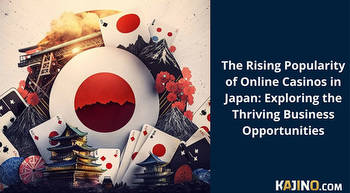The Future of Online Casinos: Navigating Challenges and Embracing Innovation

The online casino landscape is expanding at an unprecedented rate, presenting us with abundant opportunities for growth and success. However, with every new horizon comes a unique set of challenges that demand our attention and strategic planning to ensure our continued relevance and prosperity in this dynamic market. In this article, Uplatform's Maria Bashkevich delves deeper into the future of online casinos.
Online casinos have undergone a remarkable transformation, captivating millions of players worldwide with their accessibility and thrilling gambling experiences. However, as technology progresses at an astonishing pace, our industry must adapt and embrace these advancements to stay ahead of the competition. The future holds incredible potential, with emerging technologies like virtual reality, augmented reality, and artificial intelligence poised to revolutionize the way players engage with online gambling. But in order to fully harness these opportunities, we must confront and conquer the challenges that accompany the iGaming business.
Demographic Shift: Meeting the Challenge of Appealing to Millennials and Gen Z
The landscape of online casinos is constantly evolving, and one of the most significant shifts we are experiencing is the influx of millennials and Gen Z players into the industry. For operators, it is crucial to adapt and cater to the preferences of these younger generations while also maintaining a balance to appeal to the older demographic. This demographic shift poses both challenges and opportunities, and it calls for strategic efforts in technology solutions, content development, socialization, design, and marketing to effectively engage and captivate the hearts of the new wave of players.
According to the Pew Research Center, Gen Z encompasses individuals aged 9 to 24 years old. Although a significant portion of this age group is not yet legally allowed to gamble, in many states, the minimum age to play is 18. As a result, approximately 20% of Gen-Z are eligible for legal gambling at online casinos. The National Council on Problem Gambling (NCPG) released research in March indicating that gambling is already a popular activity among older Gen Z members.
Millennials and Gen Z players have grown up in a digital era, where technology is seamlessly integrated into their daily lives. They have a penchant for innovation and expect a dynamic and immersive iGaming experience. To meet their expectations, online casino operators must leverage cutting-edge technology solutions. This includes embracing virtual reality (VR) and augmented reality (AR) technologies to create lifelike and interactive iGaming environments that provide an unparalleled level of engagement. It’s most likely that Gen Z will be the next generation of iGaming enthusiasts. By incorporating these technologies into our platforms, we can transport players into captivating virtual worlds and elevate their iGaming experiences.
The Challenge of Content
Finding relevant content for the market is an ongoing challenge in the online casino industry. Finding the right mix of games that resonate with players, effectively working with them, and implementing strategic marketing approaches are crucial for better outcomes. With player preferences constantly evolving, operators must adapt by offering a diverse range of games that cater to different interests and demographics. This requires staying attuned to online casino industry trends, conducting thorough research, and leveraging player data to gain insights into the types of games that are in demand.
An emerging trend in the online casino landscape is the increasing popularity of skill-based games. Millennial and Gen Z players, in particular, seek experiences that challenge their skills and offer a sense of control and achievement. Skill-based casino games like poker, blackjack, and certain slot variations require expertise and strategy for better outcomes. In addition, mini-games like fishing, hunting, catching an egg, and building a pipeline offer engaging challenges for players to enjoy beyond traditional casino options. These games combine skill and fun, attracting a diverse audience. These games offer high-risk, high-reward gameplay, which appeals to a segment of the market that craves excitement and thrills. While they may not appeal to all players, featuring highly volatile games in the portfolio can cater to risk-takers and provide a unique iGaming experience.
However, it's crucial to strike a balance by offering a variety of games with varying volatility levels to cater to different player preferences and risk appetites. Continuous testing, monitoring, and promptly addressing issues and incorporating player feedback are vital for maintaining a high-quality iGaming environment.
AI slots have revolutionized the gambling experience for younger generations, making it more engaging and personalized than ever before. Traditional slot machines were based solely on chance, with the outcomes determined by random number generators (RNGs).
With the integration of AI in slot machines, the gambling landscape has undergone a significant transformation. For example, AI slots can recommend themes, bonus features, or specific games that are likely to resonate with a particular player based on their past activities and preferences. This level of personalization adds excitement and keeps players engaged, as they feel a deeper connection with the games they are playing.
Moreover, AI has had a considerable impact on the game mechanics themselves. Traditionally, slot machines operated on fixed paylines and static symbols. AI-driven slots, however, can dynamically adjust the game mechanics in real-time based on player behavior. This means that the odds and payouts can be adjusted according to player engagement, ensuring that the gambling experience remains captivating and challenging.
The use of AI also allows for the implementation of more sophisticated and interactive bonus rounds. These bonus features can adapt based on player skill, making them more rewarding and enjoyable for players who are more adept at certain gameplay elements.
The introduction of AI has also led to the development of "smart" RNGs. Instead of purely random outcomes, these smart RNGs take player preferences into account, creating an illusion of randomness while still aligning with the player's inclinations. This ensures that players feel they have a fair chance of winning while keeping them entertained with surprise elements.
As technology continues to evolve, we can expect AI-driven slots to become even more sophisticated, offering an unparalleled gaming experience that keeps players coming back for more excitement and fun.
Competition
The future of online casinos also faces a significant challenge in the form of competition, not just from other online casinos but also from various other forms of entertainment, particularly among the younger generation. One factor that has gained considerable attention in recent times is live-streaming.
Live-streaming has emerged as a popular and interactive medium for entertainment, allowing individuals to broadcast their activities in real-time to an audience. It has succeeded in various domains, including music and social media. Online casinos are now exploring the potential of live casino games to attract and engage users. One of the primary advantages of live-streaming is its ability to create an immersive and social experience. Online casinos can provide a more authentic and engaging environment by incorporating live dealers and real-time interaction. This appeals to younger audiences who value interactivity and socialization in their entertainment experiences.
Nowadays, many live studios feature dealer chats, where dealers actively respond to the audience and engage in conversations. This trend indicates a growing emphasis on socialization within the iGaming industry. The integration of dealer chats has transformed the traditional solitary iGaming experience into a more interactive and communal one.
With live dealer chats, players can communicate directly with the dealers in real-time, mimicking the atmosphere of a brick-and-mortar casino. This social interaction adds a new dimension to online gambling, making it more appealing to players who seek a sense of connection and camaraderie while playing their favorite games.
The dealers' responsiveness to the chat messages creates a dynamic and immersive environment, encouraging players to interact with each other as well. This not only fosters a sense of community among the players and helps build rapport and trust between the audience and the casino, leading to better player retention and loyalty.
Furthermore, the socialization trend is not limited to live dealer chats alone. Many iGaming websites now offer chat features in various games, allowing players to communicate and collaborate while playing together. Multiplayer games with integrated chat functionalities have become increasingly popular, creating virtual spaces for players to socialize, strategize, and share their iGaming experiences.
Online casinos compete for users by introducing slot providers that regularly release new, creative slots with a wide selection of themes, features, and bonuses. The emergence of branded slots may be traced back to the innovative ways in which slot providers have incorporated well-known media properties like movies, video games, music artists, and TV shows into their offerings. Slot machines have many options, one of which is the ability to purchase in-game bonuses. Exciting new features, including slots designed by artificial intelligence, will hit the market this year.
Marketing and Sustaining Long-Term Engagement
Marketing online casinos involves navigating a complex landscape of regulations and restrictions. Different jurisdictions have varying rules and regulations governing the promotion of gambling services, which can limit the marketing avenues available to online casinos. Traditional advertising channels may have restrictions on promoting gambling, and a casino platform (like on social media) often has strict policies regarding gambling-related content. This necessitates finding new and creative ways of promotion within the boundaries of the regulations. Online casinos may need to focus on alternative channels such as content marketing, influencer partnerships, and affiliate programs. By providing informative and engaging content related to gambling, online casinos can attract users organically and build brand credibility. ce?
Can the Metaverse Replace Social Media Dominance?
The convergence of the Metaverse and social media is poised to create more engaging interactions. Over the last two decades, social media has gained prominence as a platform for virtual communication, sharing interests, and conducting transactions. Yet, challenges like privacy concerns and stagnant user growth are compelling companies to rethink their approaches. The Metaverse, an extension of social media, seeks to amplify engagement through virtual and augmented reality, introducing fresh possibilities for collaboration, commerce, and experiences.
Through online platforms, Gen Z is able to forge friendships to discuss betting decisions and trends. Moreover, media platforms also serve as a place for them to engage with influencers who analyze sports to lay out prediction tips for wagers. What’s particularly interesting is how media platforms have become the new casino floors.
Changing our perspective to understand how the Metaverse might overshadow conventional social media raises thought-provoking questions. While social media has traditionally focused on virtually connecting individuals, the Metaverse revolves around immersive interaction. This shift becomes evident as various platforms originally designed for gaming, such as Roblox and Fortnite, progressively evolve into arenas for social engagement.
It's essential to differentiate between iGaming in the Metaverse and traditional iGaming. Both offer the convenience of virtually connecting with friends and social circles, eliminating the need for physical presence. However, the Metaverse takes this a step further by attempting to replicate a comprehensive casino experience. Utilizing distinctive avatars and virtual reality technology, users navigate digital casinos, mirroring real-world behavior. These avatars, essentially digital counterparts of users, interact with other avatars, simulating genuine social interactions within a casino-like environment, all while at home.
With a primary focus on casinos within the Metaverse, there's a noticeable upsurge in the integration of iGaming, and even social media platforms are beginning to embrace this trend. Furthermore, maintaining long-term engagement with players is crucial for online casinos' success. One of the key challenges in this aspect is understanding player preferences and tailoring the iGaming experience to meet their individual needs. This is where advanced profiling techniques and AI come into play. By utilizing AI algorithms and machine learning, online casinos can gather and analyze vast amounts of data about players' behavior, preferences, and playing patterns. This enables them to create detailed player profiles and develop personalized marketing strategies. AI algorithms can identify patterns and make predictions about individual players, allowing online casinos to offer tailored promotions, bonuses, and game suggestions.
By utilizing the Uplatform casino aggregator, you can quickly expand your online gambling business. A simple integration of our Ucasino content will significantly enhance your iGaming offerings, providing a wide variety of online casino games to cater to your players' preferences.
Responsible Gambling and Regulations
Responsible gambling and regulations play a vital role in shaping the future of online casinos. As the industry continues to grow, it is essential to prioritize the well-being of players and mitigate the potential harm associated with gambling. This requires a comprehensive framework of responsible gambling practices and robust regulations.
In the future, online casinos will likely face increasing scrutiny and regulatory oversight. Governments and regulatory bodies are recognizing the need to protect consumers and prevent gambling-related harm. They are expected to impose stricter regulations and guidelines on online casinos, focusing on areas such as age verification, self-exclusion options, advertising restrictions, and responsible gambling measures.
Advertising and marketing regulations will also play a significant role in responsible gambling. Governments and regulatory bodies are likely to impose stricter guidelines on how online casinos can promote their services. This may include restrictions on targeting vulnerable individuals, limitations on advertising content, and requirements for displaying responsible gambling messages and helpline numbers. Online casinos should invest in player protection measures to ensure responsible gambling practices. This includes providing resources and information about responsible gambling, implementing spending limits, and offering tools for players to track their gambling activities and set personal limits.
The future of online casinos brings forth a host of challenges that require strategic solutions and innovative approaches. Competition from various entertainment options, marketing complexities, maintaining long-term player engagement, and ensuring responsible gambling practices all demand careful consideration.

To address these challenges effectively, online casinos can benefit from leveraging the advanced tools and solutions offered by Uplatform. They provide a comprehensive suite of technologies and features, like a turnkey platform, that can help operators stay ahead in the competitive landscape. With their tools, you can explore alternative promotion channels, such as content marketing, influencer partnerships, and affiliate programs, to reach your target audience efficiently and effectively. The platform's online casino solution and sophisticated profiling capabilities enable tailored offers, promotions, and experiences that enhance player engagement and satisfaction.



































